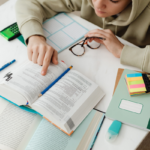Mastering the Art of Efficient Learning: Proven Memory Improvement Tips for Students
Memory Improvement Tips For Students: Boost academic performance with effective strategies like mnemonic devices, memory palaces, spaced repetition, and visual aids. Enhance focus, practice retrieval, and maintain a healthy lifestyle for optimal memory retention. Master the art of efficient learning!

Introduction
I recognize the critical role memory plays in academic performance and general learning because I am a seasoned college professor who specializes in memory development approaches. Students frequently struggle with memory recall, which might impede their progress.
I’ll provide useful, practical advice for pupils on how to improve their memory in this article. Students may improve their memory, succeed in their studies, and become more effective learners by putting these ideas into practice.
Encoding, storing, and retrieving information are all parts of the intricate cognitive process known as memory. To get the most out of their learning experience, students must have a solid understanding of how memory functions. We will investigate the several types of memory, including short-term and long-term memory, and how they affect the ability to retain information.
Active study methods are essential for improving learning and memory. In order to improve knowledge and retention, students might use strategies like taking well-organized notes, summarizing information, and even teaching concepts to others. Furthermore, employing mnemonics and other memory aides can greatly enhance memory recall, making it simpler to remember complex material.
For memory consolidation to occur during study sessions, concentration and focus must be maintained. I’ll offer advice on how to make a classroom distraction-free and conducive to learning for pupils. Including mindfulness and meditation activities can enhance memory and attention span abilities.
Students can use the strategy of loci, often known as memory palaces, as a potent memory tool. Students may successfully store and retrieve large amounts of material by linking it with specific areas in their minds, making it especially useful for disciplines that call for memory, like history, literature, or foreign languages.
Spaced repetition, which involves repeating knowledge at predetermined intervals to strengthen long-term retention, is another crucial memory-improvement technique. Flashcards or spaced repetition apps can be used by students to ensure frequent review sessions that solidify their comprehension of the subject.
For improved memory and cognitive function, a healthy lifestyle is essential. I’ll go through the value of getting enough sleep, eating a balanced diet, and exercising regularly for enhancing brain function. Techniques for managing stress will also be covered because stress can have a negative effect on memory and general academic performance.
Visual aids are important for memory retention and comprehension. I’ll teach students how to use mind maps, diagrams, and other visual aids to improve memory recall, especially while studying challenging material.
Retrieval exercise is also an effective way to strengthen memory. Students can actively recover material through frequent self-testing, practice quizzes, and mock exams, which improves memory recall and long-term retention. Let’s get started with Memory Improvement Tips For Students.
Understanding Memory
How Memory Works:
Short-term memory and long-term memory are the two main categories of memory, respectively. Your short-term memory is in charge of storing knowledge in your mind for a brief period of time, usually between a few seconds and a minute. Long-term memory, on the other hand, is where data is kept for a protracted period of time, ranging from days to years.
Information is originally stored in the short-term memory during the learning process. This knowledge can be retained in the long-term memory and made more accessible in the future by practicing and reinforcing it.
Factors Affecting Memory:
Several factors influence the efficiency of our memory:
- Attention: Paying close attention to the information you want to remember is crucial. Distractions and lack of focus can hinder the encoding process.
- Interest and Engagement: Memory is often stronger when you have a genuine interest in the subject matter. Engaging with the material actively and finding personal connections can boost memory retention.
- Emotional Connections: Emotions can impact memory formation. Information linked to strong emotions tends to be better remembered.
Implementing efficient memory improvement approaches will be made possible by having a solid understanding of these components of memory functioning. We’ll look at some useful tips in the parts that follow to help you improve your memory and perform well in your coursework. Let’s explore memory tricks and strategies designed especially for college students like you.
Effective Study Strategies

Students frequently find themselves struggling with large amounts of information in the fast-paced academic world. It’s essential for students to adopt efficient study techniques that increase memory retention and recall if they want to succeed in their coursework. Here are a few tried-and-true methods for improving learning.
Active Learning Techniques
Passive reading and listening may not be enough to solidify information in memory. Encourage active learning methods that engage the brain and foster deeper understanding:
- Taking Notes: Train students to take concise and organized notes during lectures and while reading textbooks. Summarizing main points and concepts in their own words helps reinforce understanding.
- Summarizing and Paraphrasing: Encourage students to summarize complex topics or explain them to others in their own words. Teaching concepts to peers reinforces learning and improves memory.
- Teaching Others: Encourage students to participate in group study sessions where they take turns teaching different subjects. Explaining concepts to others reinforces their own knowledge.
Organizing Study Material
A well-organized study approach is essential for effective memory retention. Help students structure their study material in a way that aids in better understanding and recall:
- Chunking Information: Advise students to break down large volumes of information into smaller, manageable chunks or categories. This approach makes it easier to process and memorize.
- Using Mind Maps: Teach students how to create mind maps, flowcharts, or diagrams to visualize relationships between concepts. Visual representations enhance memory recall during exams.
- Color Coding: Suggest the use of different colors to highlight key points and categorize information. This technique helps the brain associate specific details with visual cues, making it easier to recall later.
Mnemonic Devices and Memory Aids
Mnemonic devices are powerful memory aids that help students remember complex information by associating it with something more memorable:
- Acronyms and Acrostics: Encourage students to create acronyms or acrostics for lists or sequences. Each letter corresponds to a word or phrase, helping them remember the order of information.
- Rhymes and Songs: Encourage the use of rhymes or songs to memorize facts or key concepts. The rhythmic and melodic patterns make information more enjoyable and easier to recall.
- Visual Associations: Advise students to create mental images or visual associations for abstract concepts. Linking information to familiar objects or scenes helps enhance memory retention.
Students can take control of their academic performance by using these productive study techniques to significantly enhance their memory, comprehension, and learning. Encourage perseverance and frequent practice because acquiring these skills is a gradual process that has major long-term advantages.
Enhancing Concentration and Focus

Maintaining focus during study sessions is crucial for effective memory retention and recall. Here are practical tips to enhance concentration and improve your ability to absorb information:
- Find a Distraction-Free Environment: Choose a quiet and comfortable study space where you can minimize interruptions and external distractions. Turn off notifications on your phone and designate this time solely for focused learning.
- Set Clear Goals: Outline specific study objectives and break them into manageable tasks. Having clear goals will help you stay on track and maintain focus throughout your study session.
- Practice Mindfulness Techniques: Incorporate mindfulness practices into your routine to improve concentration. Take a few minutes to engage in deep breathing or meditation before starting your study session to clear your mind and be present.
- Use the Pomodoro Technique: This popular time management method involves working for a focused 25-minute interval (a “Pomodoro”) followed by a short break. After four Pomodoros, take a longer break. This technique can prevent burnout and keep your mind fresh.
- Eliminate Multi-Tasking: Contrary to popular belief, multi-tasking can hinder your ability to concentrate effectively. Instead, focus on one task at a time and give it your full attention.
- Stay Organized: Keep your study materials and notes well-organized to minimize time wasted searching for information. Having everything readily accessible allows you to maintain your focus on the subject at hand.
- Take Regular Breaks: Schedule short breaks during extended study sessions. Stepping away from your work for a few minutes can help you recharge and return with improved focus.
- Use White Noise or Background Music: Some students find that ambient sounds or instrumental music can create a conducive environment for concentration. Experiment with different options to see what works best for you.
- Visualize Success: Picture yourself mastering the subject matter and achieving your academic goals. This positive visualization can motivate you to stay focused and make the most of your study time.
- Stay Hydrated and Snack Smartly: Dehydration and hunger can distract you from your studies. Keep a water bottle handy, and choose nutritious snacks to fuel your brain and maintain optimal focus.
Keep in mind that improving attention is a talent that gets better with use. Be kind to yourself and continuously put these suggestions into practice to improve your capacity to focus intently on your studies, which will improve your memory retention and academic achievement.
Creating Memory Palaces
Memory palaces, sometimes referred to as the method of loci, are effective mnemonic devices that have been utilized to improve memory and aid in information retention since the dawn of time. Students can effortlessly recall enormous volumes of knowledge in a systematic and ordered manner by linking information with specific locations in a familiar context. Here’s how to successfully use and develop memory palaces.
- Choose Your Memory Palace: Select a familiar location, such as your home, school campus, or a route you often travel. The more vividly you can visualize the place, the better it will serve as your memory palace.
- Create Mental Landmarks: Within your chosen location, identify specific spots that will act as “memory anchors” or landmarks. These can be rooms, furniture, doorways, or any distinctive features that stand out to you.
- Associate Information with Locations: As you study, link the information you want to remember with each of the mental landmarks in your memory palace. Make the associations creative, vivid, and even humorous, as these tend to stick in your mind more effectively.
- Take a Mental Journey: When it’s time to recall the information, mentally walk through your memory palace, visiting each landmark. As you do so, the associated information will naturally come to mind.
- Practice Regularly: Like any memory technique, the effectiveness of memory palaces improves with practice. Revisit your memory palace regularly and reinforce the associations to strengthen your recall.
- Use Memory Palaces for Different Subjects: Memory palaces are versatile and can be adapted to various subjects. Whether you’re studying history, science, or languages, creating a different memory palace for each subject can help compartmentalize and organize the information.
- Build on Existing Palaces: As you gain proficiency with memory palaces, consider expanding your collection to accommodate more complex topics or larger sets of data. Over time, your memory palace network can become an invaluable learning tool.
Remember that your associations’ vividness and originality are what make your memory palaces successful. With some practice, this strategy can completely change the way you learn, enabling you to recall knowledge quickly and easily, which will increase your academic success and make your study experience more enjoyable.
Spaced Repetition
Spaced repetition is an effective strategy that, over time, can dramatically improve memory recall. Students can strengthen their learning and increase long-term recall by deliberately reviewing material at increasing intervals. This section will explore the idea of spaced repetition and offer helpful advice for incorporating it into your study practice.
Understanding Spaced Repetition:
The idea behind spaced repetition is that if information is not reinforced over time, our brains will eventually forget it. However, by going over the content again at predetermined intervals, the memory becomes more resilient, improving retention and recall.
Using Flashcards and Spaced Repetition Apps:
Using flashcards or specialized spaced repetition apps is one of the most well-liked ways to include spaced repetition. With the help of these tools, you can make digital flashcards that include questions on one side and solutions on the other. The software dynamically schedules further review sessions based on your performance as you go through each card. Your teacher will go over difficult concepts with you more often while spacing out easier concepts further apart.
Designing Your Spaced Repetition Schedule:
Start by dividing the study material into digestible bits or themes in order to maximize your spaced repetition plan. Depending on your level of acquaintance, rate each chunk’s difficulty. As you gain confidence, gradually increase the intervals while reviewing the more difficult ideas more frequently.
Incorporating Regular Review Sessions:
For spaced repetition to be successful, consistency is essential. Set aside certain study times, ideally spaced out over a few days or weeks, for review. Revisiting the knowledge at regular intervals strengthens the brain connections connected to that knowledge, making future retrieval easier.
Balancing Spaced Repetition with New Material:
In addition to continuing to acquire new material, periodic repetition is crucial for retaining prior knowledge. Maintain a balance between going over previous ideas and introducing new ones. To achieve a thorough and complete grasp, include new information as you advance in your studies into your spaced repetition routine.
The Benefits of Spaced Repetition:
Spaced repetition offers several advantages for students:
- Improved long-term memory retention.
- More efficient use of study time by focusing on weaker areas.
- Increased confidence in recalling information during exams and quizzes.
- Enhanced overall learning experience by building a solid foundation of knowledge.
Stay Committed and Patient:
Remember that patience and continuous practice are required for spaced repetition to be effective. Although it could take some time to see observable progress, the work will be worthwhile in the long run. As you easily handle new academic hurdles, incorporate spaced repetition into your study practice and watch your memory skills soar.
Memory Improvement Tips For Students: Healthy Lifestyle Habits

The best way to maximize cognitive performance and memory retention is to lead a healthy lifestyle, especially for students who must juggle busy academic schedules. Students can improve their memory and all aspects of their learning by adopting the following routines.
Prioritize Sufficient Sleep:
Encourage kids to create a regular sleep routine with the goal of getting 7 to 9 hours of good sleep each night. Sleep is essential for memory consolidation, which helps you remember the knowledge you learnt throughout the day. Lack of sleep can have a negative effect on academic performance by affecting focus, memory recall, and attentiveness.
Nourish with a Balanced Diet:
A well-balanced diet rich in essential nutrients, such as omega-3 fatty acids, antioxidants, and vitamins, supports brain health and memory. Students should consume a variety of fruits, vegetables, whole grains, lean proteins, and healthy fats. Avoiding excessive sugar and processed foods can also help maintain steady energy levels and cognitive function.
Engage in Regular Physical Exercise:
Exercise not only strengthens the heart but also strengthens memory and other cognitive functions. Encourage your students to engage in regular physical activity, such as jogging, cycling, or even taking fitness classes. Increased blood flow to the brain encourages the development of new neurons and improves overall brain function.
Manage Stress Effectively:
High amounts of stress might make it harder to remember things and think clearly. Give them tools for stress management, such as deep breathing exercises, meditation, or participating in their favorite activities. Encourage them to practice mindfulness during study sessions to ease anxiety and enhance mental clarity.
Stay Hydrated:
Remind children that drinking enough water will help their brains work throughout the day. Dehydration can impair memory function by reducing attention and causing cognitive fatigue. Encourage students to bring a reusable water bottle to class or during study sessions to stay hydrated.
Limit Caffeine and Alcohol Intake:
While excessive consumption of caffeine may disturb sleep patterns and harm memory consolidation, it can temporarily increase attentiveness. Similar to this, tell students to drink responsibly because excessive alcohol consumption can harm memory and cognitive function.
Cultivate Social Connections:
Memory and mental health can be enhanced by maintaining social relationships and participating in constructive social interactions. Encourage students to take part in clubs, talks, or group study sessions that are relevant to their interests. Stress can be reduced and a positive learning environment can be fostered by healthy social relationships.
In conclusion, leading a healthy lifestyle is a crucial component of helping pupils improve their memory. Students can enhance their cognitive abilities, improve information retention, and succeed in their academic activities by giving priority to sleep, nutrition, exercise, stress management, and social involvement.
Memory Improvement Tips For Students: Using Visual Aids
Utilizing visual aids while studying can dramatically improve recall and memory retention. Images are processed and remembered by our brains in a way that plain text is not. Here’s how to boost your memory by using the benefits of visual learning.
- Mind Maps and Concept Diagrams: Create mind maps or concept diagrams for complex subjects and topics. Start with a central idea and branch out into subtopics with connecting lines. Use colors, symbols, and keywords to make it visually engaging. This technique helps you see the bigger picture and the relationships between different concepts, making it easier to remember.
- Flashcards with Visuals: When using flashcards for self-testing, add visual elements alongside the written information. For vocabulary words, include relevant images to reinforce word associations. For historical events or scientific processes, include diagrams or illustrations that encapsulate the key details.
- Flowcharts and Timelines: Use flowcharts to map out step-by-step processes or timelines to understand the sequence of events in history, literature, or any subject with a chronological context. Visualizing the flow of information aids in remembering the order of events.
- Sketching and Doodling: Engage in active doodling and sketching during lectures or while reviewing study material. Visualizing concepts through drawing helps in encoding information into your memory.
- Visualization Techniques: Practice mental visualization exercises to remember abstract concepts or lists. Picture the information vividly in your mind’s eye, associating it with familiar images or places.
- Interactive Online Tools: Utilize interactive online tools and apps that allow you to create and customize visual aids like infographics, mind maps, and flowcharts. These tools often offer templates to help you get started quickly.
- Study Notes with Icons and Symbols: Integrate icons, symbols, or emojis in your study notes to represent key points or ideas. These visual cues act as memory triggers, making it easier to recall the associated information during exams.
Always keep in mind that the purpose of employing visual aids in your studies is to establish meaningful links between ideas, aiding in memory consolidation, as well as to make your study material visually interesting. Find what works best for you by experimenting with various visual strategies, and integrate visual learning into your quest to improve your memory.
Memory Improvement Tips For Students: Practice Retrieval
One of the best methods for memory enhancement is “Practice Retrieval.” Instead of passively reviewing information, this potent technique includes actively recalling data from memory. Students can greatly improve their memory retention and recall skills by regularly self-testing and practicing retrieval. Here’s how to maximize the effectiveness of this smart tactic:
- Frequent Self-Testing: Incorporate regular self-testing into your study routine. Create flashcards or quiz yourself on key concepts and facts. The act of retrieving information strengthens memory connections and reinforces learning.
- Mock Exams and Practice Quizzes: Simulate exam conditions by taking mock exams and practice quizzes. This approach not only assesses your knowledge but also provides an opportunity to reinforce memory recall and identify areas that need further review.
- Spacing Out Retrieval Sessions: Avoid cramming and space out your retrieval practice over time. Revisit previously learned material at intervals, known as spaced repetition. This technique helps consolidate information in long-term memory and prevents forgetting.
- Embrace Mistakes as Learning Opportunities: Don’t be discouraged by mistakes during retrieval practice. Errors are natural and can be valuable learning opportunities. Analyze your mistakes, understand the correct answers, and repeat the retrieval process for better results.
- Use Varied Retrieval Formats: Employ diverse formats for retrieval practice. For example, switch between multiple-choice questions, fill-in-the-blank exercises, and short-answer questions. This variety enhances memory recall by challenging your brain to retrieve information in different ways.
- Interleaved Retrieval: Mix topics and subjects during retrieval practice. Interleaving different concepts or subjects during study sessions enhances memory organization and strengthens overall understanding.
- Connect Retrieval to Real-World Application: Relate retrieved information to real-life scenarios. By connecting concepts to practical situations, you create stronger memory associations, making it easier to recall information when needed.
- Teach Others: Teach a friend, family member, or study group about the material you’ve learned. Teaching others requires retrieval of information, and the act of explaining concepts solidifies your understanding and memory of the subject matter.
Practice retrieval is a crucial tool that not only improves exam performance but also establishes a strong foundation for long-term memory retention. You’ll master the art of effective learning and achieve academic success by adopting this strategy into your study regimen.
Memory Improvement Tips For Students Conclusion
Thanks for reading our Memory Improvement Tips For Students post. Learning memory enhancement strategies is a game-changer for those looking to achieve academically. In this post, we’ve looked at a wide range of memory retention and recall techniques that are all customized just for readers like you.
These strategies give you the power to take charge of your learning process, from applying memory palaces and spaced repetition to making use of visual aids and mnemonic devices. You can maximize your cognitive talents and unleash the full potential of your memory by sharpening your focus, practicing retrieval, and leading a healthy lifestyle.
Keep in mind that improving your memory is a gradual process that calls for commitment and consistency. Accept the value of active learning, regularly evaluate your progress, and don’t be afraid to see failures as opportunities for improvement.
Include these strategies in your study regimen as you pursue your academic goals, and you’ll see your memory improve over time. With the awareness that you are in control of effective learning and long-lasting memory, you will face each new challenge with confidence.
So embrace the technique of memory enhancement and let it help you achieve more in the classroom. The quest to mastering your own memory begins right now. May your academic endeavors bring you success, comprehension, and the love of learning. Happy studying!
Frequently Asked Questions
FAQs for Memory Improvement Tips For Students
Q: Can memory improvement techniques really help me excel in my studies?
A: Absolutely! Memory improvement techniques have been proven to enhance retention and recall of information. By utilizing strategies like mnemonic devices, memory palaces, and retrieval practice, you’ll optimize your learning potential, leading to improved academic performance.
Q: How long does it take to see results from memory improvement strategies?
A: The timeline for seeing results can vary from person to person. Consistent practice is key. Some students may notice improvements within a few weeks, while for others, it may take longer. Patience and perseverance are essential as memory enhancement is a gradual process.
Q: Are mnemonic devices and memory palaces only useful for certain subjects?
A: No, mnemonic devices and memory palaces are versatile techniques that can be applied to various subjects. Whether you’re studying history, mathematics, languages, or any other field, these methods help organize and retain information effectively.
Q: Can I combine multiple memory improvement tips simultaneously?
A: Yes, combining multiple memory improvement tips can be highly beneficial. In fact, using a variety of techniques can reinforce your memory even further. For example, integrating spaced repetition with active retrieval practice and visual aids can create a robust memory improvement strategy tailored to your learning style. Experiment with different combinations to find what works best for you.



